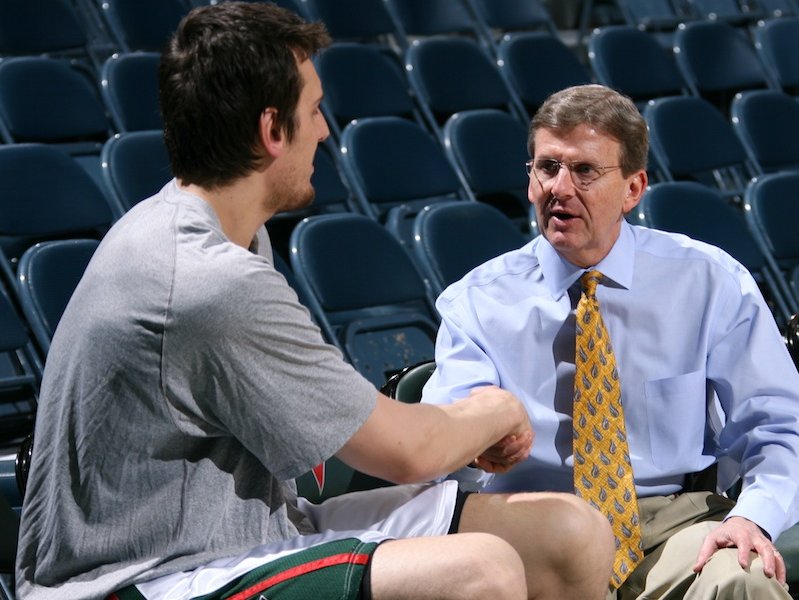It would be easy for Hammond to say so, but that's not his style. Hammond is way too honest and straight-forward for that.
"What's happened at this point in the season is somewhat unexpected," Hammond says. "I don't know if we expected to be in the playoff race and be a plus-.500 team. The so-called experts sure as heck didn't expect us to be in this position. Most picked us to be at or near the bottom of the league and we surpassed all their expectations."
His -- and everybody else's -- expectations aside, the facts remain. Milwaukee, at 36-29, isn't just hoping to sneak its way into the playoffs for the first time in four seasons; no, the Bucks are fighting and clawing their way into a favorable first round match up ... and more importantly, back to respectability.
Getting to the playoffs, though important to the development of the team and crucial to the restoration of franchise pride, is only the first step, albeit it a big one. Hammond, who admits that he's a worrier by nature, wants his team to sniff the postseason, but also wants to make sure that the Bucks become permanent fixtures in the NBA playoff picture.
It's happened before and Hammond remembers is vividly. Growing up just across the state line in Zion, Ill., Hammond watched as the Bucks dominated the NBA in the early 1970s -- winning the world championship in '71 and taking Boston to seven games in the '74 Finals. He was an assistant coach when the Bucks, under Don Nelson, were perennial contenders in the Eastern Conference during the 1980s, coming close but falling just short in a conference dominated by the Celtics and Philadelphia.
"They obviously won a championship, but they became a very good team on a consistent basis," Hammond says. "Or initial goal is to get to that point; to be a consistently good team - but not at any cost.
"Our ultimate goal, obviously, is to be a championship-contending team. If we're consistently putting a good team on the floor and not at any cost, we can have an opportunity to go from good to great."
That's where he wants the team to be in the future. Fortunately for the Bucks, he's got the experience. He was Joe Dumars' right hand man in Detroit, helping build a team that posted seven consecutive 50-victory seasons, won five straight division championships, made it to the NBA Finals twice and won it all in 2004.
It was in Detroit that he learned the "not at any cost" mantra that has been the driving factor in his reconstruction of the moribund Bucks franchise. He inherited a roster loaded with cap-crippling deals. He made the most of what he had, found creative ways to create space under the cap and set about to acquire cap-friendly players that would fit well in head coach Scott Skiles' defensive-minded system.
Sure, Carlos Delfino and Ersan Ilyasova weren't sexy free-agent acquisitions, but you can't question their productivity.
Hammond also recognized what he already had in place, signing Andrew Bogut to a five-year extension at an affordable cost of $60 million. He showed that he's willing to take a chance when he picked Brandon Jennings, who looks to be a franchise point guard, 10th overall when many teams weren't willing to take the risk.
He's smart. He's shrewd without being cheap and most importantly, he's honest; again, a trait he learned from years of experience with a championship-caliber organization.
"I used to love when people came to see us in Detroit and they'd tell me they could see how we win because of the way we work together and the way we treat people," Hammond says. "I hope that, when people come see us in Milwaukee, they can say the same thing. That's one of the keys, I think, to moving in the direction we want to be in."
So how will Hammond know when the Bucks have finally returned? Sure, wins, losses, playoff appearances and championships are one barometer, but Hammond has another one, too. As he was walking through the Milwaukee airport last week, he was reminded of his return to Detroit, two years after he wrapped up a lengthy stint there as an assistant coach.
In the airport gift shops, he saw a lot of sports apparel and souvenirs, but little from the Pistons. He noticed the same thing at Mitchell, where the shops had plenty of Brewers and Packers gear, but hardly anything from the Bucks.
"I thought to myself, maybe someday we'll be in a position where people want to sell our gear at the airport," Hammond says. "Then I guess I can say we arrived."







